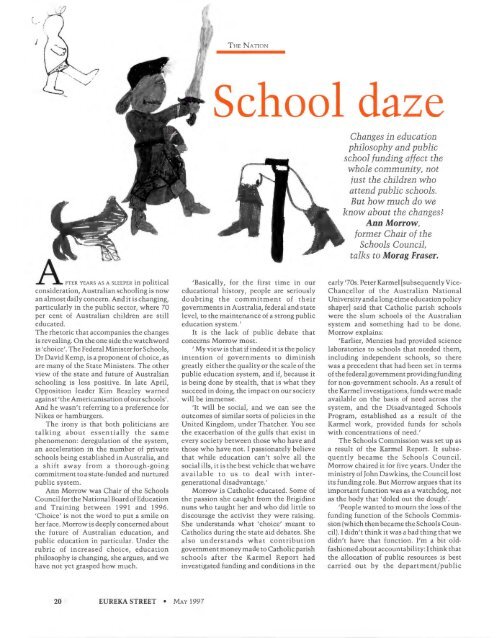jTHE N ATIONSchool dazeA nm""'A< A"'"" in po\itic•lconsideration, Australian schooling is nowan almost daily concern. And it is changing,particularly in the public sector, where 70per cent of Australian children are stilleducated.The rhetoric that accompanies the changesis revealing. On the one side the watchwordis 'choice'. The Federal Ministerfor Schools,Dr David Kemp, is a proponent of choice, asarc many of the State Ministers. The otherview of the state and future of Australianschooling is less positive. In late April,Opposition leader Kim Beazley warnedagainst 'theAmericanisation of our schools'.And he wasn't referring to a preference forNikes or hamburgers.The irony is that both politicians arctalking about essentially the samephenomenon: deregulation of the system,an acceleration in the number of privateschools being established in Australia, anda shift away from a thorough-goingcommitment to a state-funded and nurturedpublic system.Ann Morrow was Chair of the SchoolsCouncil for the National Board of Educationand Training between 1991 and 1996.'Choice' is not the word to put a smile onher face. Morrow is deeply concerned aboutthe future of Australian education, andpublic education in particular. Under therubric of increased choice, educationphilosophy is changing, she argues, and wehave not yet grasped how much.'Basically, for the first time in oureducational history, people are seriouslydoubting the commitment of theirgovernments in Australia, federal and statelevel, to the maintenance of a strong publiceducation system.'It is the lack of public debate thatconcerns Morrow most.'My view is that if indeed it is the policyintention of governments to diminishgreatly either the quality or the scale of thepublic education system, and if, because itis being clone by stealth, that is what theysucceed in doing, the impact on our societywill be immense.'It will be social, and we can see theoutcomes of similar sorts of policies in theUnited Kingdom, under Thatcher. You secthe exacerbation of the gulfs that exist inevery society between those who have andthose who have not. I passionately believethat while education can't solve all thesocial ills, it is the best vehicle that we haveavailable to us to deal with intergenerationaldisadvantage.'Morrow is Catholic-educated. Some ofthe passion she caught from the Brigiclinenuns who taught her and who did little todiscourage the activist they were raising.She understands what 'choice' meant toCatholics during the state aiel debates. Shealso understands what contributiongovernment money made to Catholic parishschools after the Kannel Report hadinvestigated funding and conditions in theChanges in educationphilosophy and publicschool funding affect thewhole community, notjust the children whoattend public schools.But how much do weknow about the changes~Ann Morrow,former Chair of theSchools Council,talks to Morag Fraser.early '70s. Peter Karmel [subsequently ViceChancellor of the Australian NationalUniversity and a long-time education policyshaper] said that Catholic parish schoolswere the slum schools of the Australiansystem and something had to be clone.Morrow explains:'Earlier, Menzies had provided sciencelaboratories to schools that needed them,including independent schools, so therewas a precedent that had been set in termsof the federal governm ent providing fundingfor non-government schools. As a result ofthe Kannel investigations, funds were madeavailable on the basis of need across thesystem, and the Disadvantaged SchoolsProgram, established as a result of theKarmel work, provided funds for scholswith concentrations of need.'The Schools Commission was set up asa result of the Karmel Report. It subsequentlybecame the Schools Council.Morrow chaired it for five years. Under theministry of John Dawkins, the Council lostits funding role. But Morrow argues that itsimportant function was as a watchdog, notas the body that 'doled out the dough'.'People wanted to mourn the loss of thefunding function of the Schools Commission(which then became the Schools Council).I didn't think it was a bad thing that wedidn't have that function. I'm a bit oldfashionedabout accountability: I think thatthe allocation of public resources is bestcarried out by the department/ public20 EUREKA STREET • MAY 1997
servants that are accountable to the electedrepresentative who is elected to make justthose sorts of decisions. So that didn't worrytne.'But the Council had an important rolein providing advice to the FederalGovernment on medium and long-termpolicy directions in relation to schools. Ourdemise was not unexpected because wewere targeted for abolition by Fightback!One, and although other things in Figh tback!One were changed, that never was. So itwas not unexpected that, when Dr DavidKemp became Minister for Education, theSchools Council went. What I think is disappointingis that he's not seen fit to replace itwith some sort of similar mechanism.'Morrow describes herself as a politicalrealist. She has been around educationpolitics long enough to understand thatnew brooms will want room to sweep. TheHoward government planned to makeradical changes to schools policies, as newgovernm ents will. What Morrow is worriedabout are the social implica tions of the newderegulation of the system and the way inwhich deregulation was effected.'When the legislation was presented inthe Parliament it was omnibus legislation,that cleverly wrapped up in the sam e Actthings as disparate as ongoing Commonwealth/public financial support forindependent and Catholic schools, andthese new ideas like the abolition of theNew Schools Policy.'Th e N ew Schools Policy wasintroduced in 1986 as a way of ensuringthat funds from the public purse would beallocated on the basis of a number ofplanning requirements. After 1986, if youwere planning to set up a new non -governmentschool, you weren't allowed toput it next door to the existing governmentschool or the existing parish school.You had to demonstrate that you weren eeded, you had to demonstrate thatyou were viable, you had to have~ a certain number of students.'.1. HAT PROCESS AND THE administrativescrutiny that went with it has, as Morrowputs it, 'all gone out the window now'.What the governm ent did before Christmaswas to deregulate, totally, the environmentfor the establishment of n ew n ongovernmentschools.Morrow is precise about the terms ofthis new environment and exactly wherethe burgeoning new independent sector fits:'We should call them publicly supportednon-government schools because many ofthem get up to 80 per cent of their recurrentexpenditure paid from government sources.That is not always known. They are beingprovided with more generous levels offunding than at any time in our previouseducation history, and thereby providinginducements for people to leave the publicsystem and go to the nongovernmentsystem.'MORROW CERTAINLY HA S NO inprincipleobjection to funding for independentschools. But priorities concern her. Andto keep scrutiny of the priorities an issue inthe public forum, she is now gearing up fora campaign, through the establishment ofthe Australian Schools Lobby.'Our Australian Schools Lobby, whichwe set up to draw public attention to thesepolicies, is not opposed to public fundsgoing to non-government schools. We arenot a part of the old DOGS [Defence ofGovernment Schools]movement. We haveno problem with the accommodation thatwas reached. We had no problems with thatas long as the funding system remained fairand as long as governments continued tobelieve that, whatever assistance was givento non-government schools, their majorresponsibility and priority in a democratic'The collaborative arrangements inmanufacturing, in factories, in industryand business, are what generateproductivity. Give people the problem,give them ownership of the problemand support them to sort it out.Why won't we do this in schools?'society where education was mandatory,(and where even to this day 70 per cent of allfamilies are still using governm ent schools)was to ensure that the public school systemremained free (in the sense of tuition beingfree), remained accessible, so that kidscould actually get to the schools, andremained secular. Which is not to say thatwe oppose government schools attendingto the spiritual needs of their students. Butwe believe that for the schools to be reallyaccessible they have to be accessible withoutreligious test.'Morrow has som e personal experienceof accessibility 'without religious test'. Shewas one of very few girls educated at theBrigidines' Kilbreda College in Melbournein the 1950s who was not a Catholic. (Thenumber of n on -Catholic students inCatholic schools h as increased exponentiallysince the 1950s). She tells a storyabout her father's reaction when, as the onenon-Catholic in her Matriculation class,she won the Christian Doctrine prize.'The traditional prize was a Catholicmissal, and my father, who was a butcher,says he was up to his elbows in pickle whenthe phone rang, and the person whoanswered said that it was Mother someone.He took his hands out of the pickle andwent to the phone. The Principal, MotherMargaret Mary, said, in her perfect IrishAustralian voice, " Mr Woodwaarrd, yourdaauughter has, on her m erit, woonn theChristian doctrine prize in Year 12. Nowthis is an unusual situation because she'sthe only non-Catholic in the class, so thetraditional prize is a Catholic missal, andsince Ann is a non-Catholic we don't thinkthat she will have any use for a Catholicmissal. Would you prefer that we boughther a King Tames version of the Bible?"'Dad said no, he would not.'The next question was, "Will you allowher to accept the prize?" "If she's won theprize on h er m erit, of course she can acceptit!" Then cam e the discussion about theKing Tames version. Dad said, "If the prizeis always a Catholic missal then that'swhat she should get."'So I went up on speech night and got aCatholic missal, which I've still got. Andthere was much rejoicing!'Such accommodation is not always thecase in newly established religious orindependent schools, however good or broadthe intentions of their founders. And it isthe bulk of students- the ones whoseVOLUME 7 N UMBER 4 • EUREKA STREET 21
















